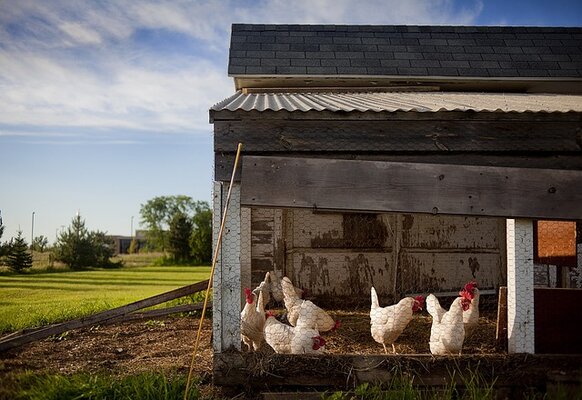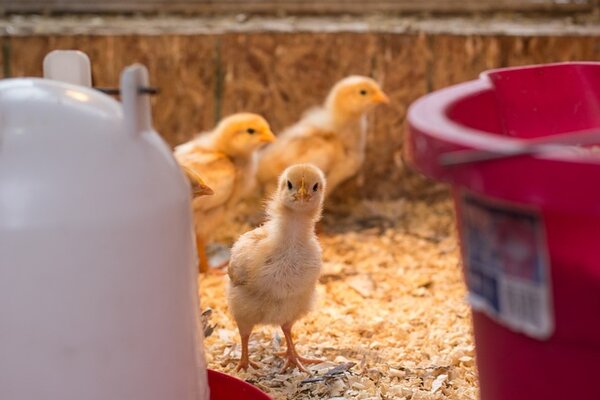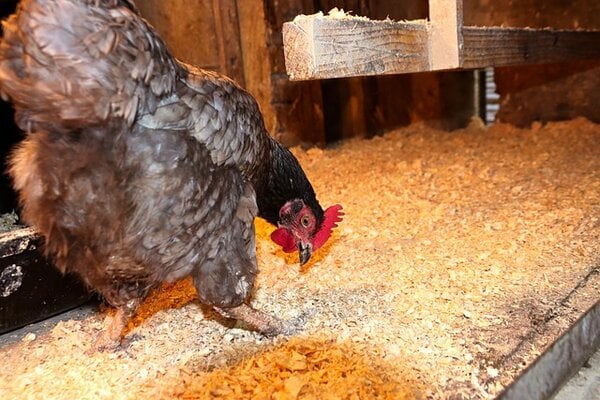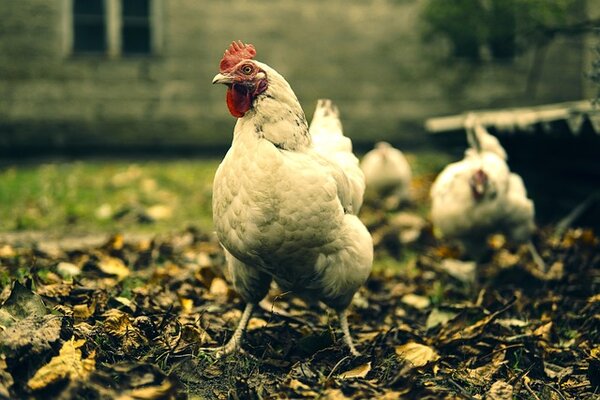Have you ever wanted backyard chickens but thought they were too much trouble to get? Were you put off by the thought of feeding, housing & cleaning their coop? Keeping poultry isn't easy, but it's not as complicated as you think!
When your coop is set up and the ladies are moving in, you can start organizing your routine. Raising chickens is much easier when you have a set routine for keeping the chores under control and minimizing time spent on them.
Here are some tips for keeping chickens that will make your life even easier and start enjoying their fresh eggs.

You probably don't have much time to spend with the hens in the morning, since you're probably getting the children to school, getting ready to go to work, etc.
In the morning, open the coop, check water & feed, and have a little chit-chat with the girls. Save time by filling a plastic jar with their feed the night before and pouring it into the coop in the morning.
Except for the egg collection, the evening routine is the same! This is chicken keeping's most exciting part! Freshly laid eggs are always fun to collect.
Taking care of chickens is as simple as that. Besides these, there are other tasks that need to be completed at least once a week. Having more chickens can be more time-consuming, as with most things.
Here are some tips for minimizing your to-do list.
Most people have automatic 'pop' doors, which open and close the coop door at a preset time. Additionally, some models are powered by mains electricity, batteries, and solar energy. Your birds will be safe in the coop when it shuts as long as they are in it when it closes.
You could make something similar if you have some handy skills. It would be up to you to decide whether or not it is right for you and your birds.
PVC piping has been used to make tube feeders by imaginative people. The feeders take up very little space and can be filled without lifting or bending down. It would be an excellent idea to use this in your coop if you have back problems or difficulty lifting and turning.
You can purchase hanging feeders, but make sure they're big enough to feed the hens for 2 - 3 days- this will save you time. The feed shouldn't be left on the ground at night, though, since it will attract pests.
Feel free to feed them table scraps now and then to supplement their diet. If your chickens free range they will scratch and peck at the ground for delicious morsels in the form of bugs and insects for a protein boost while ingesting some grit to aid digestion.

Having to collect many eggs at once and ensure they don't break can be stressful. If you're intending to collect, use fun tools like tubs, baskets, or aprons. Have fun & make it easier for yourself.
Water left for several days will become slimy and may begin to grow bacteria. Apple cider vinegar can be added to the water as an easy solution to this problem. One tablespoon per gallon is the recommended ratio.
It can be anything from a wooden tray to a mesh one or even a plastic tray that can be used as a 'dropping board. The poop gets caught on a removal tray. The tray can be emptied as often as you want.

Chicken bedding comes in many forms, including straw, wood shavings, and shredded paper. For most chicken owners personal preference and cost are the deciding factors.
Gardeners and landscapers can use composted litter as fertilizer.
Keeping them active both physically and mentally is the goal. Sedentary birds tend to get obese, just like humans. Keeping chickens busy can prevent them from developing antisocial behaviors.

Chickens are incredibly hardy and don't really need much human interaction. If you use some or all of these labor-saving ideas you'll save lots of time.
Choose the right chicken breed as there are many different breeds to choose from - some specifically bred for meat and others for egg production.
The more time you spend with your flock, the more likely they are to bond with you. As they become more familiar with you, they will become tamer. If you wish to have tame, touchable birds, with awesome temperament spend a great deal of time with them and they'll also make great pets.
Also check with your local ordinances before getting started as there may be regulations and restrictions, especially when it comes to raising roosters.
I would like to know how much time you spend with your chickens in the comments below...
When your coop is set up and the ladies are moving in, you can start organizing your routine. Raising chickens is much easier when you have a set routine for keeping the chores under control and minimizing time spent on them.
Here are some tips for keeping chickens that will make your life even easier and start enjoying their fresh eggs.
Morning & Evening Routines
You probably don't have much time to spend with the hens in the morning, since you're probably getting the children to school, getting ready to go to work, etc.
In the morning, open the coop, check water & feed, and have a little chit-chat with the girls. Save time by filling a plastic jar with their feed the night before and pouring it into the coop in the morning.
Except for the egg collection, the evening routine is the same! This is chicken keeping's most exciting part! Freshly laid eggs are always fun to collect.
Taking care of chickens is as simple as that. Besides these, there are other tasks that need to be completed at least once a week. Having more chickens can be more time-consuming, as with most things.
Here are some tips for minimizing your to-do list.
Opening & Closing the Coop
The coop must be opened and closed every morning and every night. Otherwise, you might be feeding the local predators for free! Coyote and raccoons can be quite determined to get inside your coop if they see a weak point.Most people have automatic 'pop' doors, which open and close the coop door at a preset time. Additionally, some models are powered by mains electricity, batteries, and solar energy. Your birds will be safe in the coop when it shuts as long as they are in it when it closes.
You could make something similar if you have some handy skills. It would be up to you to decide whether or not it is right for you and your birds.
Feeding Your Chickens
For starters, the average chicken consumes ½ -1 cup of food each day. It's easy to buy a large feeder that will last a couple of days, depending on how many birds you have.PVC piping has been used to make tube feeders by imaginative people. The feeders take up very little space and can be filled without lifting or bending down. It would be an excellent idea to use this in your coop if you have back problems or difficulty lifting and turning.
You can purchase hanging feeders, but make sure they're big enough to feed the hens for 2 - 3 days- this will save you time. The feed shouldn't be left on the ground at night, though, since it will attract pests.
Feel free to feed them table scraps now and then to supplement their diet. If your chickens free range they will scratch and peck at the ground for delicious morsels in the form of bugs and insects for a protein boost while ingesting some grit to aid digestion.
Collecting Eggs
If you have a lot of chickens and they lay eggs often, you should collect their eggs at least once a day, if not twice. To make your life easier, you should collect them twice a day. You should do this when you open your chicken coop in the morning and when you tuck them in at night.Having to collect many eggs at once and ensure they don't break can be stressful. If you're intending to collect, use fun tools like tubs, baskets, or aprons. Have fun & make it easier for yourself.
Chicken Waterers
Your birds need fresh & clean water. Chickens that are dehydrated will not lay eggs. Chickens can drink up to a pint of water a day, and even more than that in hot weather. Additionally, chickens will bump into the hanging drinker, causing some spillage.Water left for several days will become slimy and may begin to grow bacteria. Apple cider vinegar can be added to the water as an easy solution to this problem. One tablespoon per gallon is the recommended ratio.
Chicken Poop
Chickens poop a lot, especially when they roost at night. Is there anything you can do about this? Well, you can't stop them from pooping, so you must make it easy for them to remove this waste.It can be anything from a wooden tray to a mesh one or even a plastic tray that can be used as a 'dropping board. The poop gets caught on a removal tray. The tray can be emptied as often as you want.
Coop Bedding
Chicken bedding comes in many forms, including straw, wood shavings, and shredded paper. For most chicken owners personal preference and cost are the deciding factors.
Straw
In terms of cost, straw is the most affordable, but cleaning it up can be a hassle. It might not be a good choice for those with allergies, however.Pine Shavings
Pine shavings are an easy choice. In addition to being easy to work with, they are reasonably priced if you have a smaller-sized coop. Also, they're easy to clean up with a brush & dustpan.Shredded Paper
The use of shredded paper is very eco-friendly. Unfortunately, it's not very absorbent, it sticks to the eggs, and it's a pain to use.Deep Litter
Some prefer to use deep litter, especially in winter. The coop can be kept insulated and cleaned less using this method. The chicken waste and bedding in deep litter compost over time. More bedding is continuously added for a period of time, and then the coop is cleaned at the same time.Gardeners and landscapers can use composted litter as fertilizer.
Exercise
If your chickens won't be free ranging, it will be great if your coop has an attached run. To keep them occupied, you can provide them with toys. Your chickens will also appreciate dust-baths to relax in and clean their feathers. So have a few areas dedicated to this purpose.Keeping them active both physically and mentally is the goal. Sedentary birds tend to get obese, just like humans. Keeping chickens busy can prevent them from developing antisocial behaviors.
Seasonal Tasks
Major cleaning of your coop should be done twice a year. There is no way to avoid it. The process involves throwing out the old bedding and disinfecting the walls & floor. Fresh bedding and nesting materials can be put down once it's dried. The old bedding can be thrown in your compost pile.Chickens are incredibly hardy and don't really need much human interaction. If you use some or all of these labor-saving ideas you'll save lots of time.
Conclusion
When tasks are broken down piece by piece, your birds won't ask you for a lot of time & energy. It is up to you how much or how little time you want to spend on it.Choose the right chicken breed as there are many different breeds to choose from - some specifically bred for meat and others for egg production.
The more time you spend with your flock, the more likely they are to bond with you. As they become more familiar with you, they will become tamer. If you wish to have tame, touchable birds, with awesome temperament spend a great deal of time with them and they'll also make great pets.
Also check with your local ordinances before getting started as there may be regulations and restrictions, especially when it comes to raising roosters.
I would like to know how much time you spend with your chickens in the comments below...





